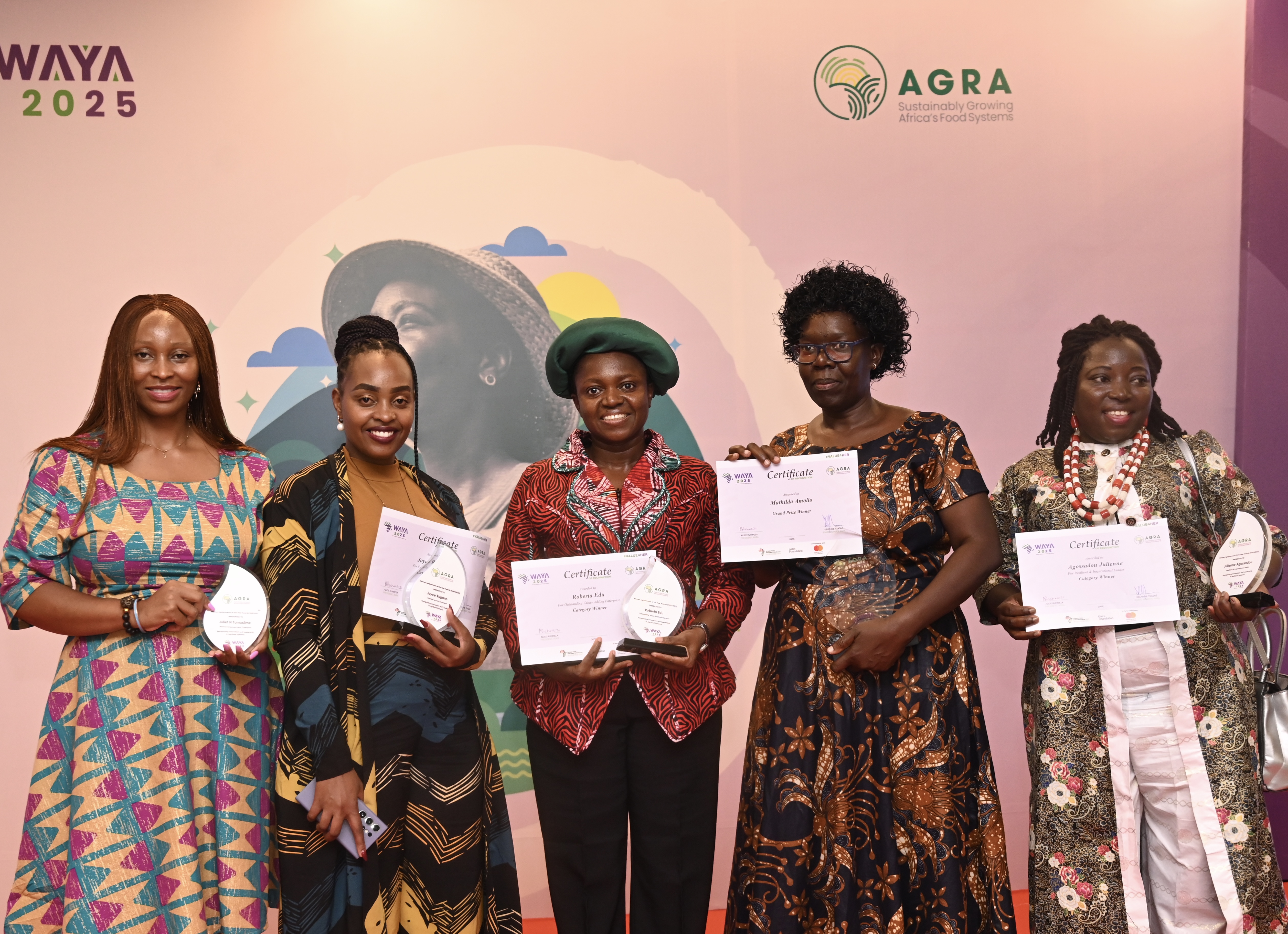
 Joyce Rugano
(second left)
and Mathildah
Amollo (second
right) during
the awards
ceremony in
Dakar, Senegal
/MATTHEW
NDANYI
Joyce Rugano
(second left)
and Mathildah
Amollo (second
right) during
the awards
ceremony in
Dakar, Senegal
/MATTHEW
NDANYI
In the backstreets of
Nairobi, where heaps of organic waste once signalled nothing more than urban
neglect, Joyce Waithira Rugano saw something different: potential.
Armed with a background in
environmental science and an eye for innovation, Rugano developed the “WasteBot
Decomposer” — a solar-powered machine capable of turning kitchen scraps and
organic waste into fertiliser in just 24 hours.
Today, her company—Ecorich
Solutions—partners with more than 400 women waste collectors in Nairobi and
supplies eco-friendly fertiliser to farmers across Kenya. It’s a closed-loop
system built on the regeneration of soil, economy and dignity.
This bold idea, born from
Kenya’s mounting waste crisis, earned Rugano the title of Female Ag-Tech
Innovator of the Year at the 2025 Women Agri-Preneurs of the Year Awards
(WAYA), in Dakar, Senegal.
Hundreds of miles away in
Siaya county, another trailblazer has been rewriting the script of agriculture.
When Mathildah Amollo
launched Greatlakes Feeds Limited in 2021, it wasn’t just about
fish. It was about freedom. Along the shores of Lake Victoria, where
generations of women had been trapped in the exploitative “sex for fish” trade,
Amollo saw the need for a new model—one that gave women the tools and knowledge
to farm fish on their own terms.
Her company now supplies
high-quality fingerlings and eco-friendly fish feed to smallholder women
farmers. But more importantly, she offers access to credit, fish cages, and
inputs—a comprehensive ecosystem of support that enables women to enter commercial
aquaculture.
Today, 70 per cent of
her raw materials come from women farmers, and the ripple effects are being felt in communities that have long been underserved.
For this work, Amollo
received the Grand Prize at the 2025 WAYA Awards, the highest honour
bestowed by AGRA under its VALUE4HER programme.
The awards ceremony, held
during the Africa Food Systems Forum, brought together some of the continent’s
most dynamic women-led agribusinesses.
Winners were from Benin,
Burundi, Congo, Malawi, Nigeria, South Africa and Uganda — each one proving that
women are not just participating in agriculture but radically transforming it.
“These founders have turned
constraints into thriving enterprises,” said Alice Ruhweza, President of
AGRA, during the ceremony.
“Collectively, they’ve
increased annual incomes by an estimated 35 per cent, saved millions of tonnes
of produce from spoilage and delivered food to over 500,000 households across
the region.”
AGRA’s VALUE4HER initiative
is more than an award platform. It’s a movement — designed to unlock access to
finance, buyers, markets and policy support for women in agriculture.
“AGRA’s role is to back
them with stronger policy support, smarter finance and access to bigger markets
so they can multiply their reach and drive systemic change,” Ruhweza said.
Nana Yaa Boakyewaa Amoah,
AGRA’s director for Gender, Youth & Inclusiveness, echoed the message.
“There are more
technology-driven models, more regional trade links and real evidence of job
creation — especially for women and youth. VALUE4HER was established to open
doors so women could lead from the front,” she said.
Behind the scenes, the
judging process was just as rigorous as the innovations it sought to
reward.
Martha Haile, Founder and
CEO of Abze Africa and one of the 2025 WAYA judges, was struck by the calibre
of entries.
“As a judge, I was
consistently impressed by the ingenuity and grit on display,” she said. “These
women leaders faced significant barriers with an incredible ability to adapt.”
From smart sensors guarding
bee colonies to bio-innovations converting waste into income, the 2025 WAYA
Awards showcased one powerful truth: African women are not just feeding the
continent — they are redefining its future.
And at the heart of it all
are entrepreneurs like Rugano and Amollo, who turned everyday problems into
extraordinary possibilities — one compost pile, one fishpond, one woman at a
time.
Instant analysis
The 2025 WAYA Awards spotlight a growing shift in Africa’s agribusiness landscape, where women-led innovations are driving both economic and social transformation. Joyce Waithira Rugano and Mathildah Amollo exemplify this movement — turning organic waste into fertiliser and empowering women in aquaculture, respectively. Their models blend technology, sustainability and inclusivity, tackling systemic issues like unemployment, malnutrition and gender-based exploitation. Beyond individual success, these awards signal a broader momentum: women are not just participating in agriculture; they are redefining it. With the right investment and policy support, their impact could reshape food systems and gender equity across the continent.











